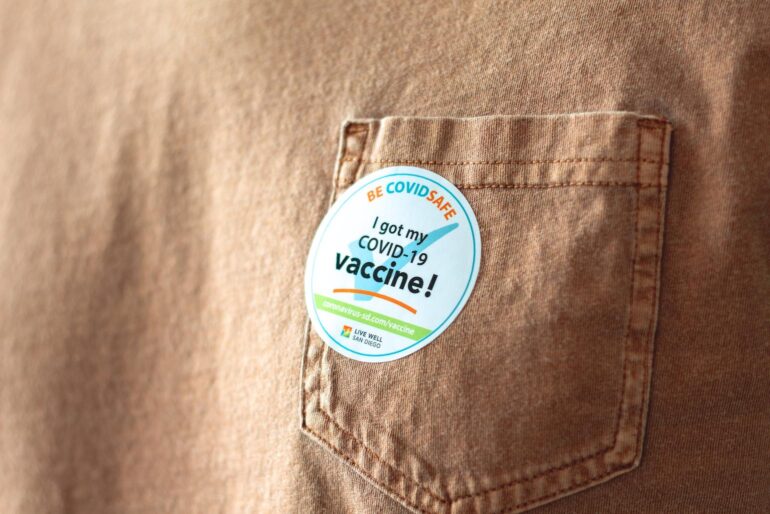Chicago marital and family therapist Kalli Rimikis-Kerr put her training to the test when her father told her he did not want to get a Covid-19 vaccine.
The 92-year-old man, who lives in Greece, was both scared and skeptical about the vaccine. Rimikis-Kerr told her father that she wanted to visit him but was concerned if he was not vaccinated, she could bring the virus to him.
“I told him that either I risked hurting him or would have to say goodbye over Facetime,” she said.
That provided the nudge her father needed to get vaccinated, she said. Offering a clear incentive, like Rimikis-Kerr did, is one strategy experts recommend to urge those who may need a push to get one of the Covid-19 vaccines.
The need is clear: A recent CBS News poll revealed that while the number of people expressing vaccine hesitancy has decreased, 4 out of 10 Americans say “maybe” or “no” to getting vaccinated.
No amount of reasoning or evidence will ever persuade some who embrace baseless conspiracies about the vaccines to get one. But others who are on the fence could be cajoled to get vaccinated and help minimize the virus, and that’s better for all of us.
Vaccine Myths

Misinformation about the Covid-19 vaccines are easily spread via social media. Some of the most common myths outlined by the CDC include:
- The vaccine can cause problems with pregnancy or fertility.
- The vaccine will alter DNA.
- The vaccine will make you test positive for COVID-19.
- The vaccine contains the virus.
To be clear, all of these assertions are false.
Twitter and Facebook, which have been used extensively to spread misinformation, are working to remove vaccine messaging on social media that is demonstrably false or misleading.
Kang-Xing Jin, Facebook’s head of health, recently told NPR: “We know that misinformation thrives in the absence of good information,” he said. “So, because of this, a core part of our strategy is actually partnering with health authorities and amplifying credible information to meet people’s needs and get their questions answered where they are.”
Dr. Paul Offit, director of the Vaccine Education Center at Children’s Hospital of Philadelphia, said the vaccine hesitant often embrace misinformation and use flawed logic in their decision-making.
“It’s all wrong,” Offit said.
If you step on a rusty nail and go to the doctor and choose not to get a tetanus shot, that is a personal decision that will only affect you, he said.
“This, however, is not an issue of freedom,” Offit said. “You are not free to catch and transmit a potentially fatal infection.”
One common question: If you’re vaccinated, why should you care if someone else isn’t? This thinking has two flaws, Offit said. The first is that vaccinations don’t provide 100% immunity, and second, there are people undergoing chemotherapy or who take medication for health conditions that suppress their immunity.
“Those people depend on others around them to keep them safe,” Offit said.
Skeptics are one thing. But others are science deniers. They are exceedingly difficult to convince, Offit said.
“A Neil deGrasse Tyson line comes to mind,” Offit said. “If people don’t use reason and logic to reach a conclusion, then reason and logic isn’t going to talk them out of it.”
What should you do and say?

Offit said for those who are convincible, communication is key. Incentives are another option, he said.
Mandates are in place for some with some colleges, universities, bars, and restaurants requiring proof of vaccination. Chicago just announced a series of concerts for the vaccinated. And the New York Yankees and Mets said they will give free tickets to those who get vaccinated at their ballparks.
Rimikis-Kerr, a licensed therapist, offered the following tips for engaging with a vaccine hesitant relative or friend:
- Attitude is important as is the delivery. No name-calling.
- Be kind. If your delivery is one of respect and cooperation, the other person will feel that.
- Inform instead of convince.
- Listen, listen, listen.
- Seek to understand. Rimikis-Kerr said a line she has heard for years is important “Strive to understand before you strive to be understood.” Defensiveness only results in a stalemate.
- Find commonalities such as “We are all concerned. We all want to get back to living.”
- Know when to stop and move on.
Offit, who wrote “Deadly Choice, How the Anti-Vaccine Movement Threatens Us All,” said the facts speak for themselves.
“Here you have a pandemic that has killed 570,000, caused enormous suffering and millions to be hospitalized. And we develop a vaccine in a year. This is as close to perfect as you can get — it’s been effective with no real side effects.”
More from Better:
- Everything You Need to Know About Getting the Covid-19 Vaccine in Chicago and the Suburbs: How, When, Where and What It’s Like
- How to Maintain Good Mental Health During the Pandemic: The Experts Weigh In
- The Best Workouts for Your Heart, According to the Experts

Susan Berger is a freelance journalist in Chicago and writes frequently for the Washington Post and Chicago Tribune. She was a 2019 fellow with the National Press Foundation Fellowship to study vaccines and spent time learning from leading experts Dr. Anthony Fauci, Dr. Willam Schaffner and others at the NIH. She was recently selected for a May 2021 fellowship with the CDC through the Association of Health Care Journalists. She also has written for the New York Times, Health Magazine, National Post, Agence France-Presse, and CBC. Susan has appeared on BBC World News, CNN, WGN-TV, WTTW-TV and on CBC Radio. A life-long North Shore resident she not only attended New Trier High School but won an Illinois Press Association Award in 2002 for her coverage of the decision to open New Trier West to freshman-only. Her work can be viewed at www.bergerreport.com and you can follow her on Twitter @Msjournalist.

